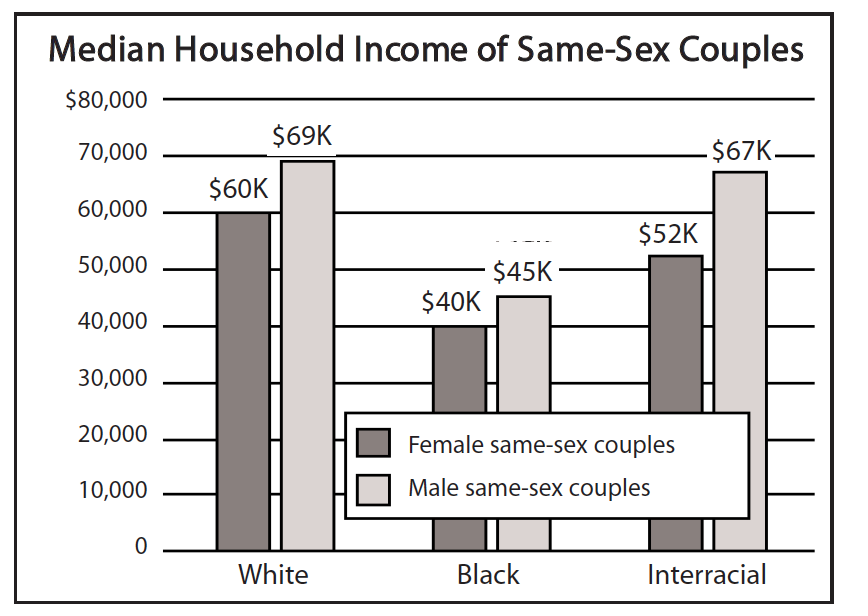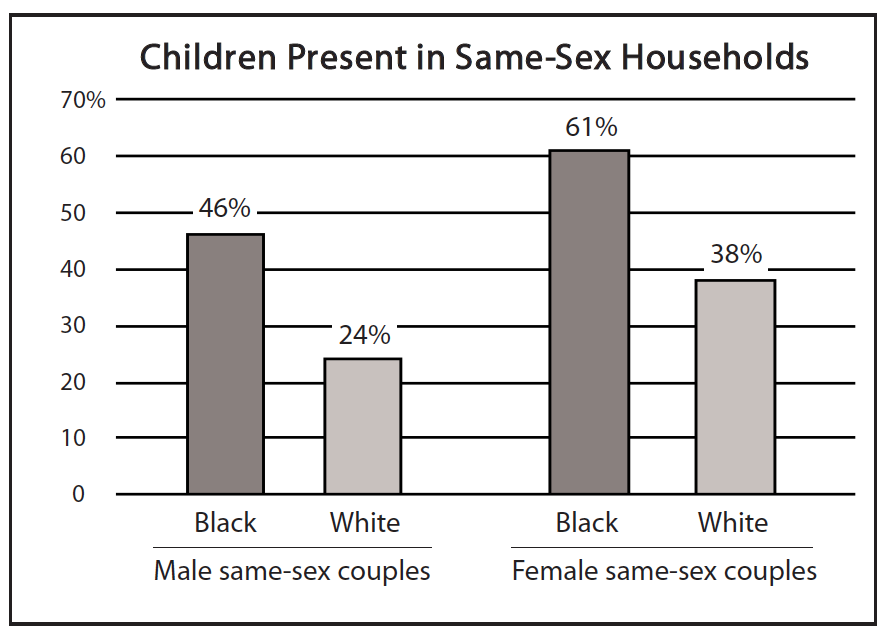ANTI-GAY ACTIVISTS frequently claim that equal rights for gay and lesbian people are a threat to the civil rights of groups they deem “legitimate minorities,” including African-Americans. For example, one flier distributed by a coalition of anti-gay organizations claimed that Martin Luther King, Jr. “would be outraged if he knew that homosexualist extremists were abusing the civil rights movement to get special rights based on their behavior” (“Center appalled by MLK use in flier,” The Miami Herald, 8/2/02). Such rhetoric implies that there are no black lesbian or gay people experiencing discrimination because of their sexual orientation. Such claims completely dismiss the existence of black same-sex couples, many with children, who would benefit from the legal protections afforded by marriage, civil unions, or domestic partnerships.
The U.S. Census does not ask about sexual orientation or gender identity as such. However, in 1990 and 2000 the Census allowed same-sex cohabiting couples to identify themselves as “unmarried partners.” Those couples in which both partners were men or both were women are considered to be “same-sex couples” or “households” for purposes of research. However, it is assumed that those indicating that they are same-sex unmarried partners are in long-term relationships involving mutual support and caring. It is likely that many of the individuals in these same-sex couples would identify as “gay,” “lesbian,” “same gender loving,” or some other term for homosexual. Others would identify as bisexual, as would many men and women in opposite-sex coupled households.
To help inform the debate on the impact of same-sex marriage in the U.S., particularly on black same-sex couples, the National Gay and Lesbian Task Force Policy Institute, in collaboration with the National Black Justice Coalition, conducted an analysis of data from the 2000 Census. This study sheds light on the basic demographics of black same-sex couples nationwide, including residence patterns, parenting rates, educational attainment, employment status, income, housing, and veteran status. To understand how recently enacted anti-gay marriage amendments will specifically affect black same-sex couples, this group was compared to white same-sex couples as well as other black family types, including black married opposite-sex couples, black cohabiting opposite-sex couples, and black single parents.
According to the 2000 Census, there are almost 85,000 black same-sex couples in the U.S., representing about fourteen percent of the 600,000 same-sex couples of all races. These couples and their families will be disproportionately harmed by state anti-gay- marriage amendments. Despite the prejudice they may face due to racism and homophobia, many black same-sex couples manage to create and sustain stable families, many of them with children, defying hurtful stereotypes about both black people and gay and lesbian people.
Anti-gay marriage state and federal constitutional amendments will disproportionately harm black same-sex couples and their families because they are already economically disadvantaged compared to black married opposite-sex couples—even more so when compared to white same-sex couples. Black same-sex couples report lower annual median household income than black married opposite-sex couples. Black female same-sex couples report a median income of $9,000 less than black married opposite-sex couples, while black male same-sex couples report a median income of $2,000 less than black married opposite-sex couples. Black same-sex couples also report lower annual median household income than white same-sex couples. Black female same-sex couples report a median income of fully $18,000 less than their white counterparts, while black male couples report a median income of $20,000 less than do white male couples. Black same-sex couples are also less likely to report home ownership than black married opposite-sex couples. Sixty-eight percent of black married couples report home ownership compared to only 54 percent of black male couples and fifty percent of black female couples.


Because black same-sex couples earn less and are less likely to own their home than whites, they are more likely to be harmed by the effects of being barred from the legal protections that marriage provides. Lack of access to these protections, in turn, diminishes their earning power and thus their ability to save money, to provide for their children, to buy a house, and so on. Not being able to take advantage of your partner’s health care plan, for example, is that much more devastating for a couple that’s already struggling financially. And even if a same-sex couple is so fortunate as to receive domestic partner health insurance through an employer, unlike a married couple they must pay state and federal taxes on it as income. Same-sex partners are not eligible for 1,138 federal protections and benefits available to married couples, including Social Security survivor benefits, Medicaid spend-down protections, and worker’s compensation. Over a lifetime, ineligibility for these benefits means that black same-sex couples often pay more in taxes but receive less in public benefits than other Americans. They are also ineligible for non-financial protections that affect job security, such as the right to take unpaid leave from work to care for one’s partner under the Family and Medical Leave Act.
Black same-sex partners are presumably more likely than whites to rely on public sector domestic partner health insurance, which is threatened by the anti-gay marriage amendments. Black men and women in same-sex households are about 25 percent more likely than white men and women in same-sex households to hold public sector jobs (sixteen percent of black same-sex partners hold public sector jobs, versus thirteen percent of white same-sex partners). Many municipalities and state governments now offer domestic partner health insurance to employees in same-sex relationships (along with spousal health insurance to married employees). Because many of the anti-marriage amendments that were approved in the 2004 election go beyond banning same-sex marriage and either ban or threaten domestic partner health insurance, such initiatives are a special threat to black men and women in same-sex households.
Anti-gay family policies disproportionately harm black same-sex couple families in the U.S. because they’re more likely to be raising children than white same-sex couples. Black female same-sex households are raising children at nearly twice the rate reported by white female same-sex couples, at 61 percent versus 38 percent, respectively. Black male same-sex households in the U.S. are raising children at almost twice the rate reported by white male same-sex households, at 46 percent versus 24 percent.
 The families created by black same-sex couples are in many respects similar to those of other black families. Black female same-sex couples are raising non-biological (foster or adopted) children at the same rate as black married opposite-sex couples (at fourteen percent), while black male same-sex couples are raising non-biological children at a slightly lower rate than black married opposite-sex households (ten percent versus thirteen percent). Black women in same-sex households are raising children at almost the same rate as black married opposite-sex couples (61 percent versus 69 percent), while black men in same-sex relationships are parents at about two-thirds the rate of married opposite-sex couples (46 percent versus 69 percent).
The families created by black same-sex couples are in many respects similar to those of other black families. Black female same-sex couples are raising non-biological (foster or adopted) children at the same rate as black married opposite-sex couples (at fourteen percent), while black male same-sex couples are raising non-biological children at a slightly lower rate than black married opposite-sex households (ten percent versus thirteen percent). Black women in same-sex households are raising children at almost the same rate as black married opposite-sex couples (61 percent versus 69 percent), while black men in same-sex relationships are parents at about two-thirds the rate of married opposite-sex couples (46 percent versus 69 percent).
Black same-sex couples are almost as likely as black married couples (47 percent versus 58 percent)—and more likely than black opposite-sex cohabiting couples (at 19 percent)—to report living in the same residence as they did five years earlier. What this suggests is that most black same-sex couples are in long-term, stable relationships—contrary to the claim frequently made by anti-gay groups.
Black men and women in same-sex households report serving in the military at especially high rates, despite the risk of losing their income and benefits under the ten-year-old “Don’t ask, don’t tell” policy. Partnered black women in same-sex households report veteran status at nearly four times the rate of black women married to a male partner (eleven percent versus three percent). Black men in same-sex households report veteran status at about three-fifths the rate of black married men (eighteen percent versus 31 percent). Black women are discharged from the military under “Don’t Ask, Don’t Tell” at rates far exceeding their representation among all service members. Although they make up less than one percent of the military, they represent three percent of all those discharged under this policy. But despite well-documented, widespread harassment and violence against lesbians and gay men in the military, black lesbian, gay, and bisexual people continue to serve their country at high rates.
Anti-gay leaders and organizations have long sought to divide the black and gay communities. They talk as if there were no black GLBT people experiencing the double-edged sword of discrimination, and even portray nondiscrimination laws covering sexual orientation as a threat to other people of color. However, data from the 2000 Census clearly identify a large population of black same-sex couples in the U.S., more than half of whom are raising children. These black same-sex partners would benefit from nondiscrimination policies as well as the protections offered by family recognition.
Anti-gay policies, including the recently passed state anti-gay marriage amendments, will disproportionately harm black same-sex couples and their families because they further penalize those who are already disadvantaged in terms of income and home ownership. Because black people in same-sex relationships are more likely to be raising children and working in the public sector than whites, they have more at stake when anti-gay family amendments are on the ballot. Removing discriminatory legislation and allowing black same-sex couples access to all the benefits available to married people will hurt no one, and will enable a group of Americans to do more to support and protect their families.
Alain Dang is a policy analyst, and Somjen Frazer a Vaid Fellow, at the National Gay and Lesbian Task Force Policy Institute. This article has been excerpted from the Institute’s 2004 report, “Black Same-Sex Households in the United States.”





